Stormy Daniels Testifies and I Have Questions
I will be breaking down live tweet testimony from Stormy Daniel's appearance yesterday to discuss what stood out for me legally and what bothered me as well.
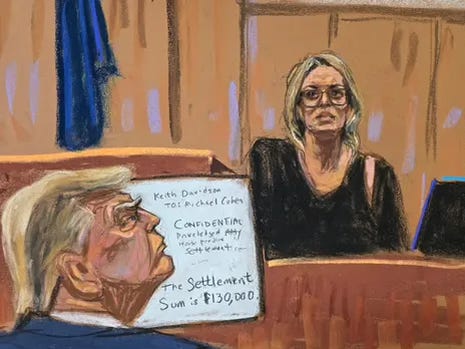
I did not follow the testimony of Stormy Daniels in Donald Trump’s criminal fraud trial yesterday in real time. I was checking in on major headlines and quickly reviewing trends to see what happened, but I had assumed that prosecutors would lead their star witness through a very detailed interview that did not reveal much of what the public didn’t already know.
I tweeted out the statement above last week about Hope Hicks testifying last Friday, and I felt confident that this statement would apply, in most part, to the details we would hear from Stormy Daniels when she took the stand. I was fairly sure that all of the legally relevant portions of her statements had already been made and that we had all discussed those details so much that this appearance was more of a formality than anything else. I was wrong.
I take great issue with the fact that cameras and audio are not being allowed into the courtroom to show the American public all of the real-time details of what is happening as it happens. When I am trying to discern how a jury is reviewing information, I need to see what the jury is seeing in order to have a full grasp of the events playing out.
While I appreciate the live tweeting that is being done by several outstanding reporters in the courtroom, we can’t rely solely on their impressions of the impact different witnesses are making, or how people are coming across to other people. The actual word-for-word testimony is essential, and we are able to get some chunks of that through the in-house reporters or through the transcripts. This way makes it hard to assess behaviors of the people, which is a major factor in reading the jury. For these reasons, I have been a little less exuberant about my own coverage of the trial.
Here is an example from an NBC News article providing compressive coverage of the events, that is a direct quote and stands alone with no further explanation:
“At one point, Merchan warned Trump's lawyer that his client's behavior was ‘contemptuous,’ that Trump could be heard cursing and seen shaking his head.”
While this sentence purports to describe what happened in clear detail, it is far from clear for me. I can’t discern what contemptuous can mean in this context, from a formal judge, when he is discussing the behavior of Donald Trump. I also need to know exactly what “curse” word was used. Was it a compound curse? Think about the difference between someone being called the “c-word” and the “b-word” or even an “f-ing b-word.” What exactly was said and how it was said is important, because that is what the jury saw.
I started reviewing testimony remotely yesterday to get more answers, and it was clear that Ms. Daniels had explained specific details of what had happened between herself and the former president. But, by the way the details were being reported at first glance, it appeared that Stormy Daniels had said some incredibly graphic and disturbing things on the stand, and that her encounter with Trump may have been “non-consensual.”
There were reports that Trump’s counsel had made a motion for a mistrial based on the whole prejudicial nature of Daniels testimony, so given what we already knew about the sexual exchange I was very concerned about what had been said on the witness stand. While this kind of “what could it hurt?” motion is to be expected at every juncture from Trump’s side, the reaction from Judge Juan Merchan that was being reported concerned me. From the bench, the judge said "there were things that would have been better left unsaid,” and he added that he would strike some of Daniels' testimony from the record.
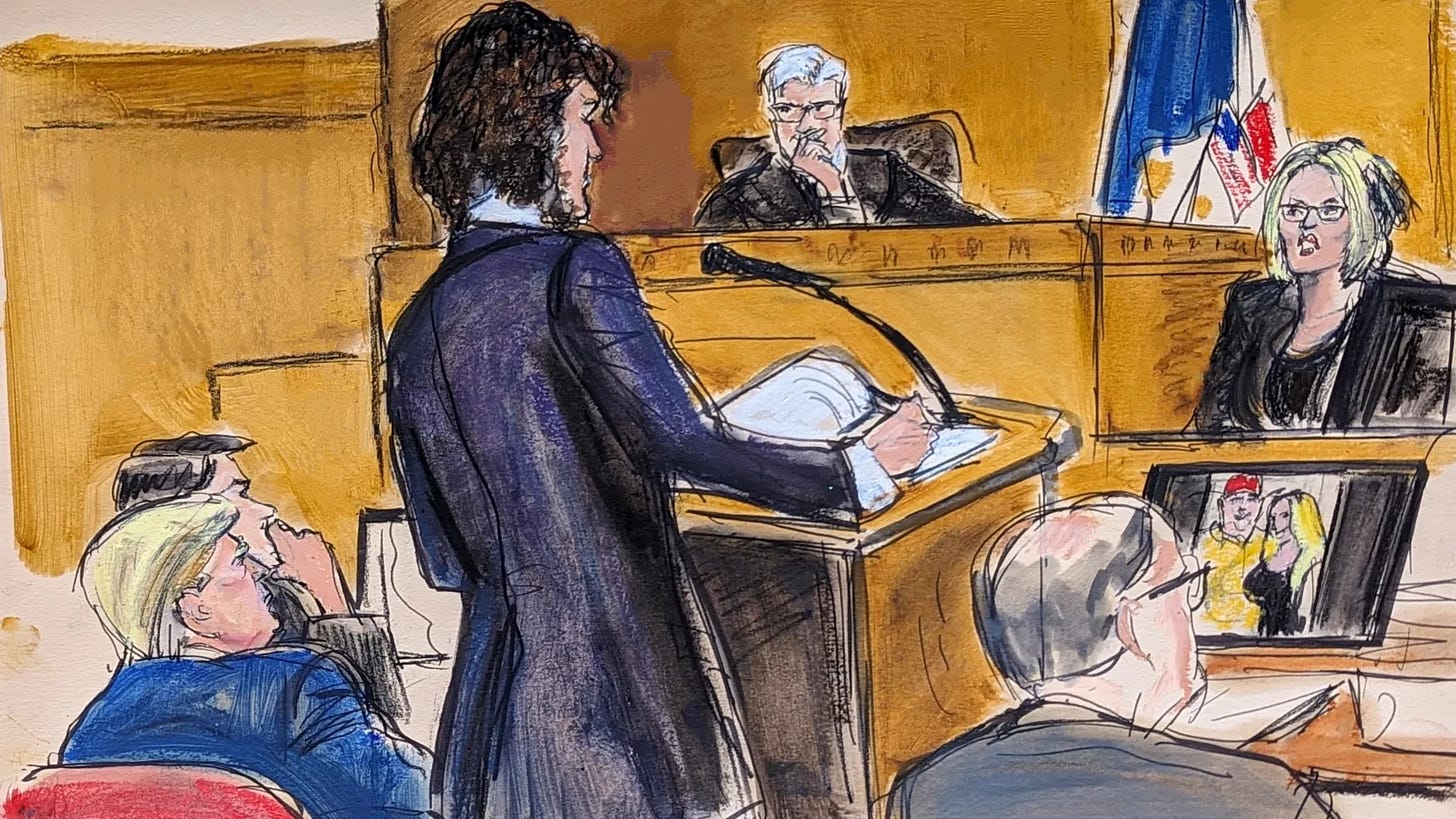
As a prosecutor, your job is to put a witness on the stand who will leave no doubts in a jury’s mind as to what exactly happened and how those events pertain as evidence to the allegations being charged. So, what exactly had happened here? The questions I immediately had were, “Wait, is she saying this could have been a sexual assault? and “Is she saying she felt literally or figuratively drugged?” I also wanted to know what could be worse in a description of what happened than all of the things we have already heard, mushroom parallel included.
Daniels said she felt "there was an imbalance of power, for sure” as if she had felt drugged. Wait a minute. Is she saying she felt figuratively drugged or literally drugged — because that makes a huge difference in the entire exchange. Let’s take a look at what was said during this portion, tweet by tweet.
Reading this chain of testimony, it sounds like someone who is about to explain the details of a sexual assault. It is not until the end of a lot of this that we read: “she clarifies that she was not drugged.” After the defense makes an objection to the above chain we return to testimony with Daniels stating for the record that she was not drugged and had no alcohol. Okay, so Daniels is not alleging that Trump went full Cosby in this situation, but the way she is recounting what we have all assumed up to this point was a consensual encounter is very alarming.
Next, we have another batch of testimony where Daniels describes a “power imbalance” but she says she was not threatened physically or verbally. Her last statement above, that she was staring at the ceiling and didn’t know how she got there is a classic example of someone recounting a traumatic experience. Let’s continue:
She basically recounts being frozen in the situation, and in the aftermath her hands shaking so badly that she could not put on her gold strappy heels. (It’s important to note that I believe the reporter above incorrectly stated "yes” with regard to the question about whether Trump wore a condom, as evidenced by what is said later.) She testifies that it bothered her that he did not wear a condom, but she said nothing in the moment. She also says that she never said “no” at any point. Then we have this final statement: “I told very few people we actually had sex because I felt ashamed I didn’t try to stop it or say no.”
Stormy Daniels’ recollection of her sexual experience with Donald Trump is completely different from what I had assumed and even thought I knew about it from her own interviews and previous reports. Maybe she never felt legally safe describing what really happened until she was on a witness stand and protected from the litigiousness of Trump. I believe what she is saying here, and I can understand why she would have withheld certain details before, but as a woman and a lawyer I have even more questions.
Are we overlooking the fact that this appears to be a nonconsensual sexual assault because Stormy Daniels is a porn star and we are therefore taking all of her credibility away by default? Did people rush to call her a prostitute because she took a payoff to keep quiet about sleeping with a married man, like many victims of sexual assault often do? At the very least, this was a sexual quid pro quo kind of arrangement, as Stormy fully thought Donald Trump was interested in helping her secure a role on The Apprentice, and we know about his penchant for quid pro quos.
What is also incredibly interesting is that the piece of testimony from Stormy Daniels, that is most important to proving the fraud charge, is sandwiched right there in between the details that even the judge said he could do without:
Stormy Daniels testified that Donald Trump had no interest in concealing what had happened between them at that moment or at any time in the near future. It wasn’t until Trump became the Republican nominee and was gaining traction in 2016, that Trump maneuvered to buy her silence through Michael Cohen.
This testimonial evidence forms the crux of the prosecution’s legal theory that Trump falsified business records to cover-up the payments to Stormy Daniels and Karen McDougal that were made to keep them quiet to protect him politically. For me, this testimony by Stormy has done far more than the prosecution was seeking to do with regard to proving their case — it leaves me with more questions about Donald Trump’s criminal liability with regard to his treatment that night of Stormy Daniels.
Amee Vanderpool writes the SHERO Newsletter and is an attorney, published author, contributor to newspapers and magazines, and analyst for BBC radio. She can be reached at avanderpool@gmail.com or follow her on Twitter @girlsreallyrule.
Paid subscriptions and one-time tributes embedded in each article allow me to keep publishing critical and informative work that is sometimes made available to the public — thank you. If you like this piece and want to support independent journalism further, you can forward this article to others, get a paid subscription or gift subscription, or donate once, as much as you like today.


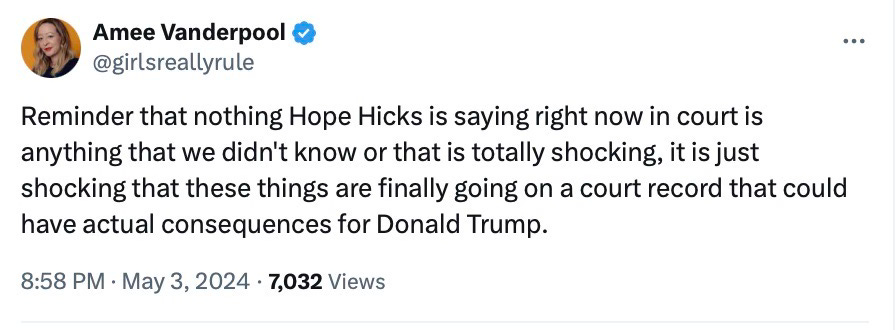
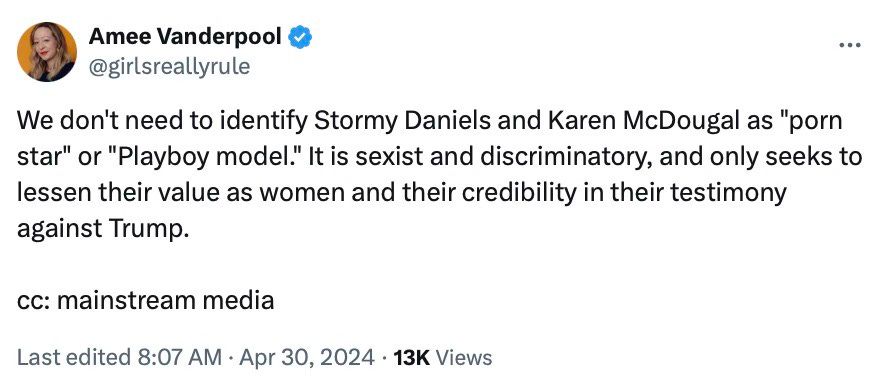
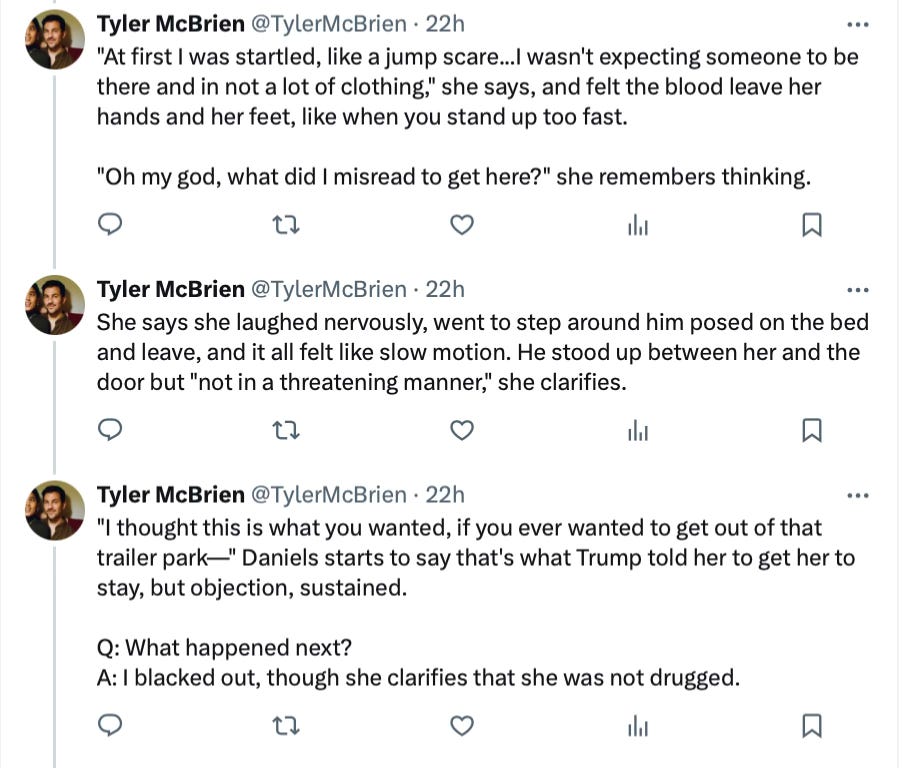
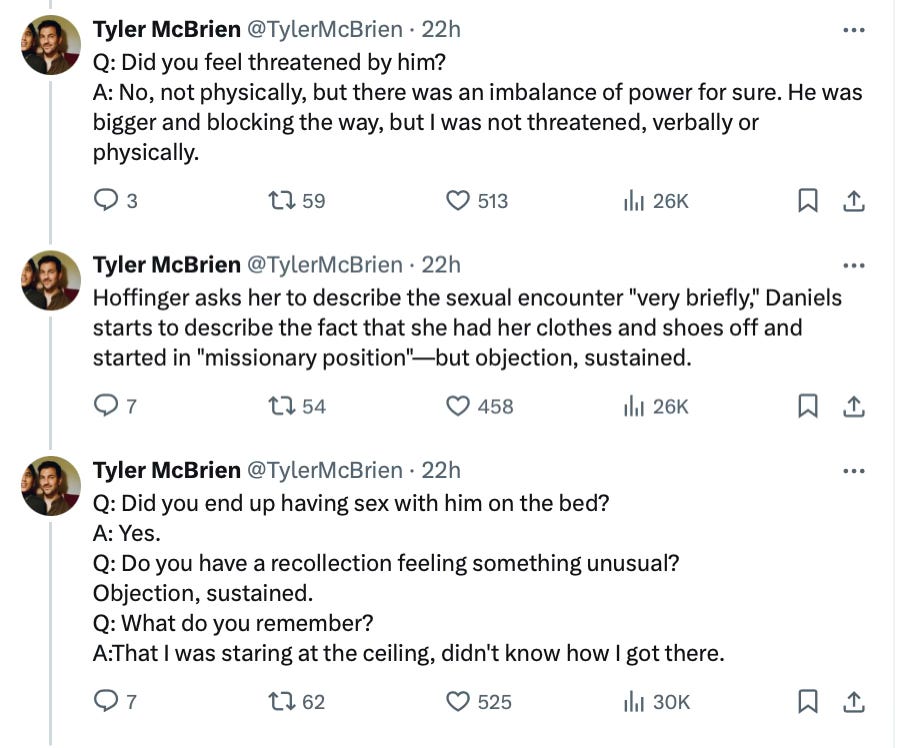
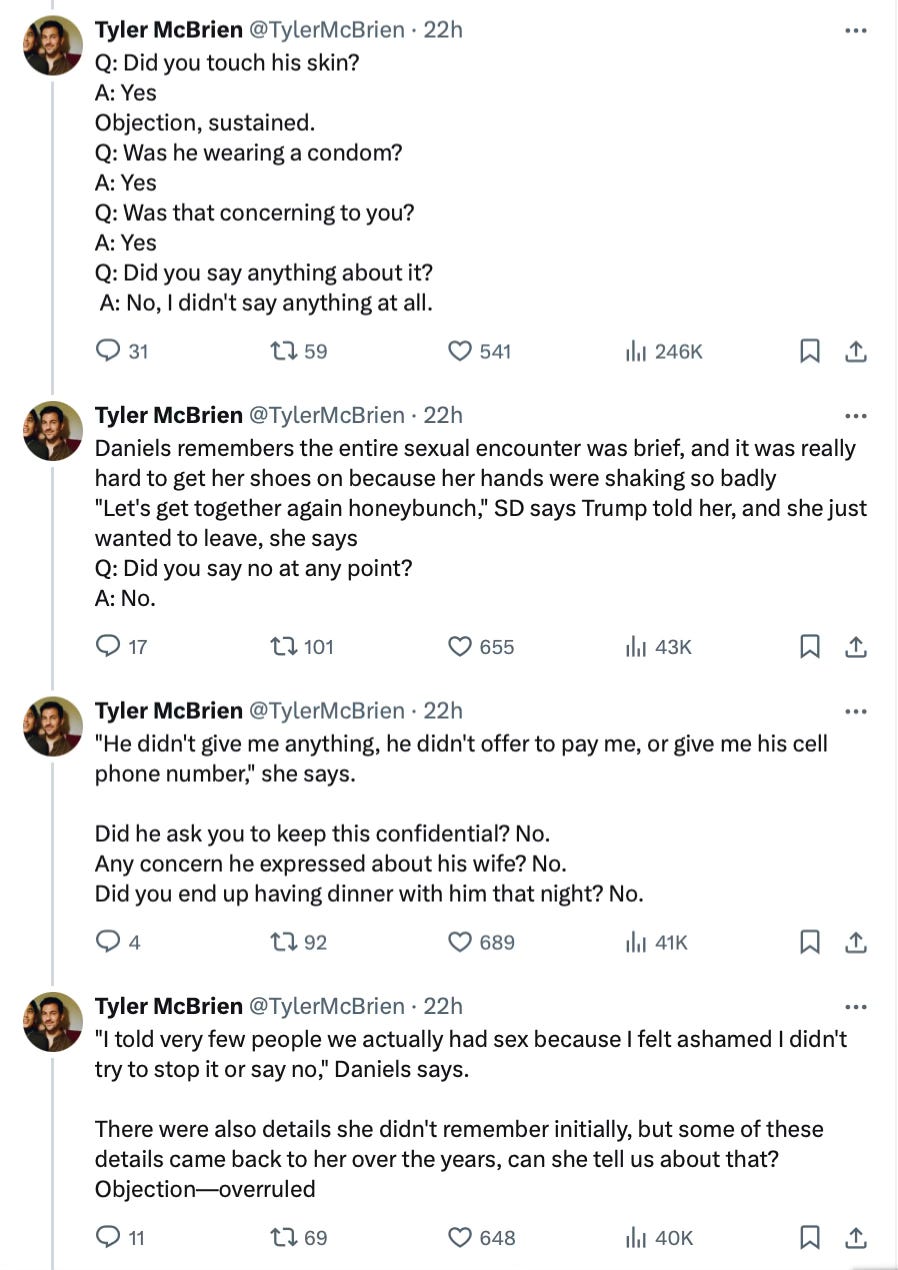
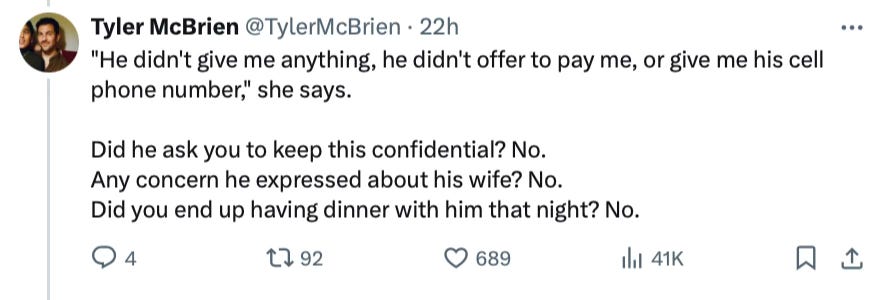
What I can glean from this is that Trump had no interest in hiding what happened with Stormy from his wife, and that it only became important when he was running for president, especially in light of the Access Hollywood interview. So, his "excuse" that he didn't want Melania to know is bull. I hope that the jurors understand how clear this is from Stormy's testimony. Also, her profession should be discounted and not used in the trial. It's discriminatory and misleading.
It certainly does sound like a sexual assault😥